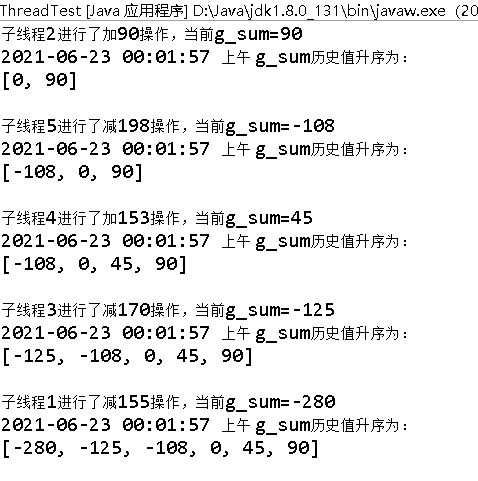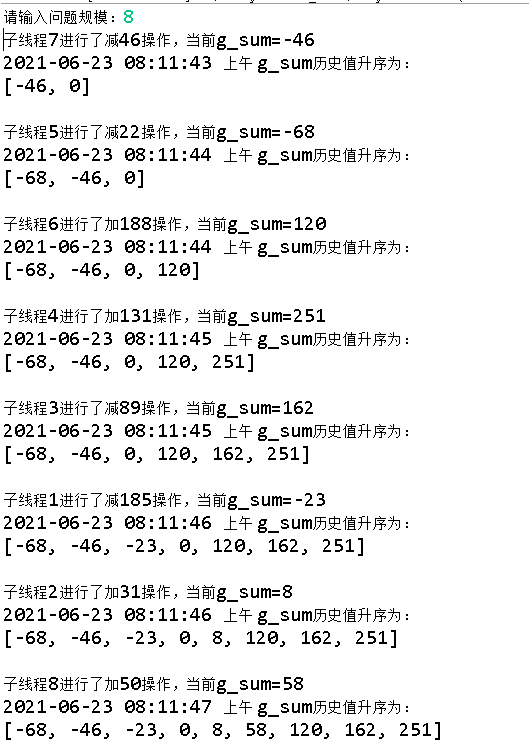问题描述:1个父线程,并发生成N(N作为参数传入)个子线程。设定全局变量 g_sum=0,每个子进程在 0至200中随机选择一个数;
若子线程的进程ID是奇数则g_sum=g_sum-随机数,
若子线程的进程ID是偶数则g_sum=g_sum+随机数,
每个子线程对g_sum操作完成后都要通知父线程,父线程收到通知后输出“子线程{进程ID}对g_sum进行了[加/减]{随机数}操作,当前g_sum={新值}”,父进程将每次g_sum的新值进行记录,并对已记录的数组进行升序排列,每次重新排列后进行一次输出。
想法一 回调方式
1
2
3
4
5
6
7
8
9
10
11
12
13
14
15
16
17
18
19
20
21
22
23
24
25
26
27
28
29
30
31
32
33
34
35
36
37
38
39
40
41
42
43
44
45
46
47
48
49
| public class ThreadTest {
public static int g_sum = 0;
public static List<Integer> g_sumList = new ArrayList<Integer>();
public static Object o= new Object();
@SuppressWarnings("unchecked")
public ThreadTest() {
super();
this.g_sumList.add(g_sum);
}
public static void callBack(int id, int num, int flag) {
String mark = flag == 1 ? "加" : "减";
System.out.println("子线程" + id + ":对g_num进行了" + mark + "" + num + "操作,当前g_sum=" + g_sum);
g_sumList.add(g_sum);
Collections.sort(g_sumList);
SimpleDateFormat sdf = new SimpleDateFormat();
sdf.applyPattern("yyyy-MM-dd HH:mm:ss a");
Date date = new Date();
System.out.println(sdf.format(date)+" g_sum历史值升序为:");
System.out.println(g_sumList);
System.out.println();
}
public void generateThreads(int N) {
int randomNum;
for (int id = 1; id <= N; id++) {
randomNum = (int) (Math.random() * 200);
MyRunnable myRunnable = new MyRunnable(id, randomNum);
Thread t=new Thread(myRunnable);
t.start();
}
}
public static void main(String[] args) {
ThreadTest test = new ThreadTest();
test.generateThreads(10);
}
}
|
MyRunnable.java
1
2
3
4
5
6
7
8
9
10
11
12
13
14
15
16
17
18
19
20
21
22
23
24
| public class MyRunnable implements Runnable {
private int id;
private int randomNum;
public MyRunnable(int id, int randomNum) {
super();
this.id = id;
this.randomNum = randomNum;
}
@Override
public void run() {
synchronized (ThreadTest.o) {
if (id % 2 == 0) {
ThreadTest.g_sum += randomNum;
ThreadTest.callBack(id, randomNum, 1);
} else {
ThreadTest.g_sum -= randomNum;
ThreadTest.callBack(id, randomNum, 0);
}
}
}
}
|

子线程和父线程之间其实并没有进行通信,打印信息的静态回调方法callBack()虽然是在主类中定义,但是却是在子线程中调用的,而不是子线程将信息传递并通知给主线程,然后主线程打印。
想法二 消息队列
ThreadTest.java
1
2
3
4
5
6
7
8
9
10
11
12
13
14
15
16
17
18
19
20
21
22
23
24
25
26
27
28
29
30
31
32
33
34
35
36
37
38
39
40
41
42
43
44
45
46
47
48
49
50
51
| public class ThreadTest {
public static int g_sum = 0;
public static Deque<Message> messageDeque = new ArrayDeque();
public List<Integer> g_sumList = new ArrayList<Integer>();
public static Object lock= new Object();
public ThreadTest() {
super();
this.g_sumList.add(g_sum);
}
public void generateThreads(int N) {
int randomNum;
for (int id = 1; id <= N; id++) {
randomNum = (int) (Math.random() * 200);
MyRunnable myRunnable = new MyRunnable(id, randomNum);
Thread t=new Thread(myRunnable);
t.start();
}
}
public static void main(String[] args) throws InterruptedException {
System.out.print("请输入问题规模:");
Scanner in = new Scanner(System.in);
int N = in.nextInt();
ThreadTest test = new ThreadTest();
synchronized (lock) {
test.generateThreads(N);
while(true) {
if(messageDeque.isEmpty()) {
lock.wait();
}
while(!messageDeque.isEmpty()) {
Message mess = messageDeque.pop();
System.out.println("子线程"+mess.tid+"进行了"+mess.op+""+mess.randomNum+"操作,当前g_sum="+mess.g_sum);
test.g_sumList.add(mess.g_sum);
Collections.sort(test.g_sumList);
System.out.println(mess.opeTime+" g_sum历史值升序为:");
System.out.println(test.g_sumList);
System.out.println();
}
}
}
}
}
|
MyRunnable.java
1
2
3
4
5
6
7
8
9
10
11
12
13
14
15
16
17
18
19
20
21
22
23
24
25
26
27
28
29
30
31
32
33
34
35
36
37
38
39
40
41
42
43
44
45
46
47
48
49
50
51
52
53
54
55
56
57
58
59
60
61
62
63
| public class MyRunnable implements Runnable {
private int tid;
private int randomNum;
public MyRunnable(int id, int randomNum) {
super();
this.tid = id;
this.randomNum = randomNum;
}
@Override
public void run() {
synchronized (ThreadTest.lock) {
SimpleDateFormat sdf = new SimpleDateFormat();
sdf.applyPattern("yyyy-MM-dd HH:mm:ss a");
String opeTime = sdf.format(new Date());
if (tid % 2 == 0) {
ThreadTest.g_sum += randomNum;
Message message = new Message(tid, "加", randomNum,ThreadTest.g_sum,opeTime);
ThreadTest.messageDeque.add(message);
ThreadTest.lock.notifyAll();
} else {
ThreadTest.g_sum -= randomNum;
Message message = new Message(tid, "减", randomNum,ThreadTest.g_sum,opeTime);
ThreadTest.messageDeque.add(message);
ThreadTest.lock.notifyAll();
}
try {
int sleepTime = (int)(Math.random() * 500);
Thread.sleep(sleepTime);
} catch (InterruptedException e) {
e.printStackTrace();
}
}
}
public class Message{
public int tid;
public String op;
public int randomNum;
public int g_sum;
public String opeTime;
public Message(int tid, String op, int randomNum,int g_sum ,String time) {
super();
this.tid = tid;
this.op = op;
this.randomNum = randomNum;
this.g_sum = g_sum;
this.opeTime=time;
}
}
}
|

主线程并发创建N个子线程后,转为阻塞等待状态,等待lock解锁获得执行权且消息队列非空,然后一次性打印消息队列中已经存放的消息。
子线程在进行“加减”操作完成后,创建一个消息(包含线程id、随机数、操作类型、操作结果、操作时间信息),并把这个消息添加到消息队列(一个静态全局的队列),然后Notifiy(通知)唤醒主线程,通知它消息队列有消息可以打印了。



